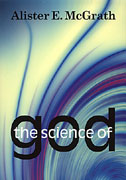Alister McGrath: The Science of God
 Alister E. McGrath, The Science of God: An Introduction to Scientific Theology (Grand Rapids: Eerdmans, 2004), 271 pages.
Alister E. McGrath, The Science of God: An Introduction to Scientific Theology (Grand Rapids: Eerdmans, 2004), 271 pages.
Alister E. McGrath personifies an eclectic and exciting combination of interests and abilities. Professor of theology at Oxford University and principal of Wycliffe Hall, Oxford, he is also director of the John Templeton Oxford Seminars on Christianity and Science. He holds doctorates from Oxford in molecular biophysics and historical and systematic theology. Born in Belfast, Northern Ireland, his prolific publications in both theology and science have been translated into more than twenty languages. McGrath is especially well-suited to bridge the chasm-like gulf between the all-too-often warring worlds of theology and science. Those who, agreeing with Galileo, “do not feel obliged to believe that the same God who endowed us with sense, reason, and intellect intended us to forgo their use” (Des MacHale, Wisdom, London, 2002), will appreciate McGrath’s ability to correlate theological faith and scientific investigation. Distinctions between science and theology are not collapsed, however; the two are considered positive dialogue partners with disciplinary specific modes of investigation.
The Science of God is a single-volume summary of and introduction to McGrath’s three-volume A Scientific Theology (T & T Clark, 2001-03). It makes abstract and obtuse material more clear and concise. This is not to say sections such as those studying how “ontology determines epistemology” or surveying a priori v. a posteriori metaphysics will not require some work! McGrath explores interfaces between theology and the natural sciences, addresses theological methodology, and defends the overall theological enterprise. He is concerned to construct a public theology countering isolationist inclinations in contemporary theology by building a comprehensive theological system drawing on insights of natural science in conversation with Christian theology. McGrath is sustained by a strong evangelical orientation to Scripture and the gospel of Christ. Though ecumenically open and interactive, he critiques other positions and contrasts them with his own in a constructive fashion. Notable examples include reviews of Enlightenment reductionism and radical postmodernism as well as reevaluations of Karl Barth on natural theology or George Lindbeck on the nature of doctrine. He probably disagrees most forcefully with John Milbank and the “radical orthodoxy” movement. He admittedly relies heavily on T. F. Torrance and Alasdair McIntyre. For McGrath, the Christian doctrine of creation provides ample ontological imperative for engagement between theology and the natural sciences. He ties together creation and Christology nicely with his oft-repeated idea that “what is embedded in creation is embodied in Christ.” Though Alister McGrath sees “scientific theology” as an essentially Christian endeavor, he does not altogether excluding other religions from the dialogue process. Indeed, he argues the value of a Christian natural theology for viewing the “trans-traditional religious quest”, but prefers the Christian tradition’s “robust and resilient account of reality.”
Category: In Depth, Spring 2007


